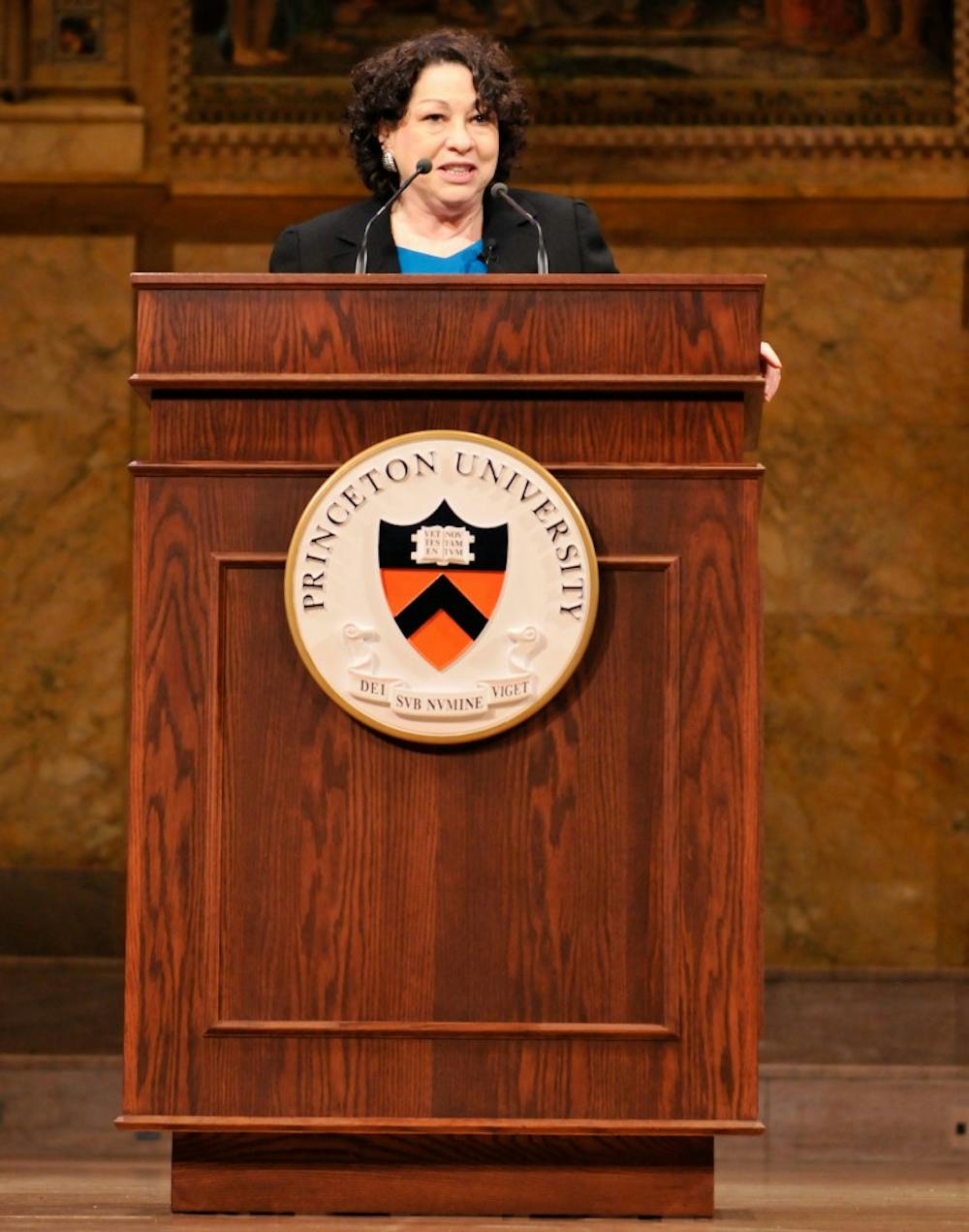The University should consider changing its motto to “Princeton in the nation’s service, in the service of all nations and in the service of humanity, one person and one act at a time,” Sonia Sotomayor ’76, associate justice of the U.S. Supreme Court, told a standing room-only crowd at Richardson Auditorium in a Saturday morning lecture entitled “In the Nation’s Service.”
Sotomayor was this year’s recipient of the University’s Woodrow Wilson Award, the highest award for undergraduate alumni. The Woodrow Wilson Award recognizes alumni whose careers reflect a commitment to service. The lecture was not open to the public, as the speech was a part of Alumni Day activities.
While praising the legacy and role of Woodrow Wilson, Class of 1879, in inspiring Princeton students, Sotomayor said she did not agree with his definition of service as “the air of the world’s transactions, the consciousness of the solidarity of the race, the sense of the duty of man toward man” and “the compulsion of the national life.”
“We cannot tell our children that they must perform service, only to turn around and define it in such towering and abstract terms that the concept loses motivation force,” she said. “We need to break down for them what service actually means into understandable, concrete, day-to-day goals and actions.”
Sotomayor explained that service is “multi-dimensional” rather than just taking the form of “becoming a cabinet secretary or judge.” She added that service is about relationships that are built with family, friends and peers in the community, recounting a story involving her mother as an example of one form that service can take. She explained that on the day the Senate was voting on her nomination to the U.S. Court of Appeals for the Second Circuit, she had spent hours trying to reach her mother, only to find that her mother had been taking a friend to the doctor’s office.
“My mother was an incredible role model of what it means to sacrifice one’s own interests to help another in need,” Sotomayor said.
Sotomayor noted that she continually keeps service at the forefront of her priorities by asking herself “Have I helped someone today?” and “What have I learned today?” She noted that she recently began volunteering at a local Washington, D.C. charity, which she said is something that she routinely looks forward to.
“I had too easily got caught up in the bustle of my demanding profession,” she explained. “It is true of our students, too. In this increasingly competitive age, there are so many students who focus exclusively on winning the next gold star.”

Service applies “even to those with whom we may have a profound disagreement,” Sotomayor said. “I think the answer in remaining collegial is in identifying and embracing the things we share in common as people, not the things that divide us.”
She said that, while her colleagues are just as passionate about the Constitution and the United States’s system of government as she is, they may disagree on how to promote those ends. Nevertheless, she said that she and her colleagues do not disagree on their fundamental importance.
The University has been very successful at producing world leaders, she said, but she added that work’s ultimate value derives from the contribution it makes to others, and this ultimate value can be derived from many occupations, not just senior government and business positions.
“It is the act of working with the understanding and appreciation that work should be service that ultimately will provide a sense of fulfillment in each person’s life,” Sotomayor said. “Not everyone can be President or a Supreme Court justice, but everyone can approach their own work with a passion for making a difference in the lives of those they serve."

Service can take also take the form of apparent failures, Sotomayor noted. She cited as examples Woodrow Wilson’s attempt to establish residential colleges that was only realized decades later, and her fellow associate justice Ruth Bader Ginsburg’s “powerful dissenting opinion” in Ledbetter v. Goodyear Tire & Rubber Co. Bader Ginsburg’s opinion later led Congress to change the rules governing the statute of limitations for women claiming unequal pay violations, when the majority of the Supreme Court declined to do so.
Sotomayor’s speech was marked with numerous moments of levity. She said that her stomach sank when she realized that she would have to come up with something worth saying to accept her award, and she also said jokingly that the University’s early request for a title for her speech led her to “plagiarize.”
At another point, she recalled helping a friend’s daughter move into the University and joked that only a woman without kids would show up at an incoming freshman’s house in “tiny BMW cab.” She added that another friend lent her a van only after “breaking out in laughter.”
After giving her speech, Sotomayor walked directly into the audience to answer questions and to take photographs with the attendees.
She addressed a wide variety of subjects, responding to a question about government surveillance by asking if “giving up of privacy is something we’re willing to accept” and answering a question about judicial activism by noting that the people, the Court, the legislature and the executive have all led the way on different issues.
She also recommended the book “The Strange Alchemy of Life and Law,” a semi-autobiographical novel about South African jurisprudence, and noted that she has completed a “century ride,” a bicycle ride of 100 miles. She added that she also enjoys cooking with friends and seeing dance troupes.








